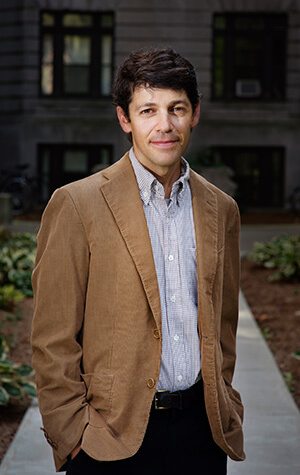Income inequality has been rising in the United States for several decades, and the majority of Americans tell pollsters they think the level is too high.
Why, then, has the response from policy makers been so tepid—even under popular two-term Democratic presidents? That is the question BU’s Ray Fisman and many other economists have been asking. One possible contributing factor, Fisman and his colleagues found in a recent study, is that those who make and influence policy care a lot less about economic equality—and more about economic efficiency—than do average Americans.
“Ours is an argument that pushes back, at least in part, against the claim that politics has been captured by economic elites,” says Fisman, the first College of Arts & Sciences Slater Family Professor in Behavioral Economics. “We provide a less insidious—but still problematic—explanation for limited redistribution. Politicians are acting on their principles, but these principles—which emphasize efficiency at the expense of equality—diverge from those of everyday Americans.”
Fisman’s study, published last fall in Science, notes that economic redistribution policies that benefit the middle class and poor almost always involve a cost in terms of lost, or wasted, resources. It examines people’s attitudes toward two trade-offs that shape social and economic policy: efficiency vs. equality and selfishness vs. fair-mindedness. “The trade-off between selfishness and fair-mindedness informs the willingness of the haves to make sacrifices in order to aid the have-nots,” Fisman says. “And the trade-off between efficiency and equality goes to the familiar conundrum of whether economic policy should concentrate on growing the economic pie or on promoting the pie’s even distribution.”
Elites in the study were more likely to be classified as selfish (and hence less likely to be classified as fair-minded) than average Americans. More important, Fisman says, the research found that elites were much less willing to sacrifice efficiency for equality than the average American was. (That is, elites care more about growing the size of the economic pie than ensuring everyone gets the same-size slice.) The more elite they were—in terms of education and income—the more the study subjects favored efficiency over equality. What the study called the extreme elites—a group of 208 Yale Law School students—held these attitudes despite the fact that the overwhelming majority of them self-identified as progressive Democrats. The Democratic Party has been traditionally thought of as the party of economic equality.
For the study, the researchers asked the Yale Law School students and hundreds of other Americans to play a variation of what economists call a dictator game: subjects were told to distribute a pot of real money between themselves and an anonymous other person. Subjects could keep or give away as much of the money as they liked. The twist was that the price of giving—or redistribution—varied. In some cases, giving was expensive: for every dollar a subject paid out, the other person might get only a dime. In other cases, giving was cheap: for every dollar given, the other person might get as much as $10. Most choices fell somewhere between these two extremes.
“You can think about this price as capturing how much societal wealth is lost when a more productive member of society redistributes to a less able—and hence, initially poorer—individual,” says Fisman. “For example, in some decisions, subjects may be able to give $10 for each dollar of their own income they give up. Giving in this case is cheap. At the other extreme, subjects may only be able to pass on 10 cents for each dollar they give up, so giving is expensive. An efficiency-minded individual will always keep everything when giving is expensive—rather than ‘waste’ a dollar only to produce 10 cents in giving—while giving up everything when it is cheap to do so. Why keep the dollar when you can make someone else $10 richer? But this creates extreme inequality—one person ends up with everything and the other with nothing. An equality-minded person will always ensure that both parties end up with the same amount. And many subjects will do so even when it leads to a much, much smaller pie.”
Three different classes of subjects played the game: average Americans, who came from the American Life Panel (ALP), an internet-based pool of Americans from across the economic and social spectrum assembled by the RAND Corporation; intermediate elites, made up of undergraduates at the University of California, Berkeley, one of the most selective schools in the country, and ALP subjects who hold graduate degrees and have annual household incomes of more than $100,000; and extreme elites, composed of three cohorts of students from Yale Law School, the country’s most selective law school. As the study points out, graduates of the top law schools typically receive salary offers of $160,000 (often augmented by signing bonuses) on graduation. Two of the past three US presidents and all nine sitting Supreme Court justices graduated from either Yale Law School or Harvard Law School.
Yale Law students favored efficiency over equality by a factor of four to one. ALP subjects split about evenly between focusing on efficiency and equality. Intermediate elites favored efficiency over equality by a factor of roughly three to two.
The study also found that the Yale students’ attitudes toward efficiency vs. equality trade-offs predicted their career choices. Equality-minded subjects were more likely to work for nonprofit organizations, with a focus on the equality-related rights and interests of the disenfranchised. Efficiency-minded subjects chose the corporate sector.
If our reporting has informed or inspired you, please consider making a donation. Every contribution, no matter the size, empowers us to continue delivering accurate, engaging, and trustworthy science and medical news. Independent journalism requires time, effort, and resources—your support ensures we can keep uncovering the stories that matter most to you.
Join us in making knowledge accessible and impactful. Thank you for standing with us!

